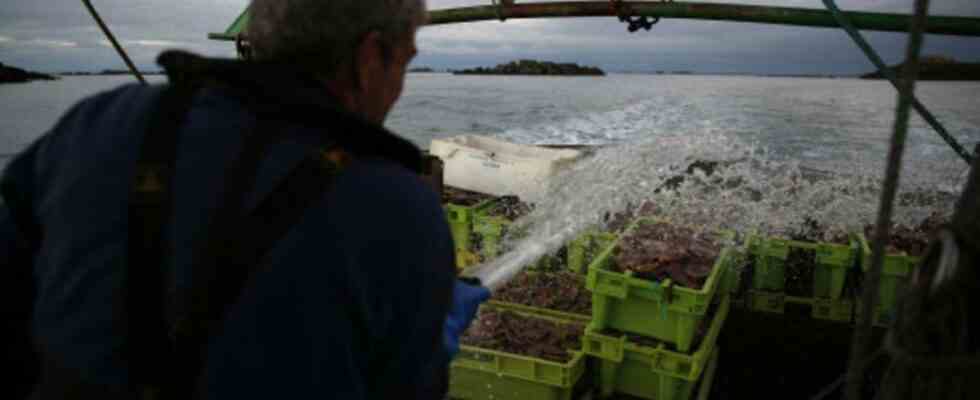Prohibit bottom trawling in all marine protected areas. The proposal by Caroline Roose, Green MEP, was not binding, but it has sparked controversy in the European Parliament in recent days between ecologists and Renew Europe, a group which brings together liberals and the center-right including La République en Marche. As a reminder, this fishing technique scrapes the seabed and destroys the habitats of many species.
In a tweet relayed nearly 5,000 times, Claire Nouvian, president of the Bloom association, which fights against the destruction of the ocean and fishermen, denounced a “climaticide amendment”, carried by Pierre Karleskind, MEP Renew Europe. By having it adopted, “Emmanuel Macron’s group in the European Parliament has just prevented the vote for the banning of destructive fishing methods in marine protected areas”, she writes, indignant at a “real disaster for climate and biodiversity”.
The amendment finally adopted promotes the prohibition of the “use of harmful techniques in strictly protected marine areas [de l’Union européenne], based on the best available scientific advice”. A name that reduces the field of action since strictly protected areas only correspond to 1% of European waters.
Claire Nouvian, in her thread, was annoyed by a “scandalous maneuver” by LREM, contrary to her commitments. For her, this vote proves that the ecological nation promised by Emmanuel Macron is “a sham”.
FAKE OFF
What happened ? With tweets and press releases on social networks, each camp defended its positions. Pascal Canfin, Renew MEP, published a text on Linkedin to support his colleague, Pierre Karleskind, although he did not vote for his amendment. He explains that the initial proposal (which he nevertheless supports) did not take into account the full complexity of the situation and that it would have posed “economic problems for certain fishermen and certain territories”. Some protected areas are “for the birds, he adds, which can make it difficult for fishermen to understand the fact of prohibiting a fishing practice”.
Pierre Karleskind explains to 20 minutes that the green amendment was “excessive” and did not take into account the “socio-economic impact” of the abolition of bottom trawling for fishermen. His proposal, on the contrary, was “a compromise position”, “pragmatic”, which could be voted on.
Main criticism against this amendment: the fact that it prohibits a practice already prohibited in these strictly protected areas. For Claire Nouvian, it is useless, and, in addition, dangerous: “It calls into question the standards of nature protection, she tells us, by unraveling what a marine protected area is. In a marine protected area, as defined by the International Union for Conservation of Nature, destructive fishing methods and industrial extractive activities are prohibited. The European Union must conform to international standards. »
An amendment “shameful in relation to the climate emergency”
With Pascal Canfin, explains Pierre Karleskind, they worked on a “more ambitious” amendment. In the end, it was not presented, because “the Greens felt that it did not go far enough and the Conservatives that it went too far, we would not have had a majority”. Acknowledging that his amendment “is not sufficient” and that it will not respond “to all the problems of protecting the oceans”, Pierre Karleskind nevertheless defends his position which “allows us to keep a message in this text on prohibition of harmful practices in strictly protected marine areas”. He prefers to highlight the rest of the report and the fact that other associations, such as the NGO Oceana, welcome this text.
Downside: Oceana recognizes the progress of the report in its press release, but Nicolas Fournier, its campaign director for the protection of marine environments, regrets the adoption of this “minimalist” amendment, “which weakens the scope of the text” and is “shameful relation to the climate emergency”. It also has “no added value since it calls on the European Union to ban deep-sea trawling in strictly protected areas, where in theory there is no fishing and therefore no trawling”.
According to the NGO, trawling is practiced in 86% of marine protected areas in the EU. Bloom wanted to denounce “the attempted sabotage of this report by the LREM delegation to Parliament”, he argues.
A battle for nothing?
For him, the vote for the proposal of the green MEP was not necessarily lost in advance. As proof, he says, three other amendments green were adopted. This is “a strong signal” for the European Commission to take up the subject, hopes Oceana. One of these amendments, “revolutionary” for Nicolas Fournier, asks the Union to prohibit “all industrial extraction activities harmful to the environment”, such as mining or the extraction of fossil fuels in marine protected areas.
Another wants to restrict the use of the most harmful fishing gear on the climate, the integrity of the seabed, fish populations. Mentioned are bottom gears – including trawling –, drift nets, bottom seines or fish aggregating devices. “This amendment has a broader scope than marine protected areas and is politically very interesting on the interactions between fishing and biodiversity,” says Nicolas Fournier. The last aims to identify “carbon-rich marine habitats” to preserve them from activities such as trawling, which are likely to release trapped CO2.
Why this battle then against an amendment? For the campaign manager of Oceana, the explanation comes from the “fierce” lobbying of the fishing sector which alerts “as soon as a report speaks of a single gear”, which would be considered discriminatory. However, remind MEPs and associations, this initiative report is not binding. It affirms the position of the European Parliament on the subject and proposes measures to the European Commission. Next step: the future law on the restoration of nature, which must be unveiled by this summer by the Commission.

